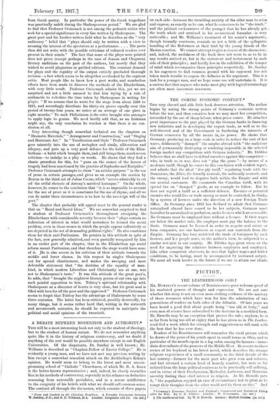THE COMING ECONOMIC CONFLICT.*
Tins very shrewd and able little book deserves attention. The author begins by noting the strong points of Germany's economic system before the war, and then considers how we may meet her competition, intensified by the use of cheap labour, when peace comes. He attaches great importance to the part played by the German banks in financing new industries and in developing the export trade, as well as to tho well-directed zeal of the Government in furthering the interests of German commerce by all the means ins its power. Ho shows that Germany, producing on a large scale in order to reduce the cost of her wares, deliberately " dumped " the surplus abroad with " the malicious aim of permanently destroying or rendering impossible in the selected foreign market any competition with German industry." Mr. Dibble() believes that we shall have to defend ourselves against this competitor— who, in trade as in war, does not " play the game "—by means of a moderate tariff, though he comes to this conclusion with evident regret, and admits that the ideal " five-ply tariff," regulating trade with the Dominions, the Allies, the friendly neutrals, the unfriendly neutrals, and the enemy, would lead to disputes both within the Empire and with our neutral customers. He commends the Canadian tariff, with its special tax on " dumped " goods, as an example to follow. But ho does not regard a tariff as a sufficient defence. Enemies or potential enemies who would live or trade among us must be controlled, he thinks, by a system of licences under the direction of a new Foreign Trade Office. As Germany since 1913 has declined to admit that Germans naturalized abroad have ceased to be her subjects, Germans must hereafter be naturalized on probation, under licences which are revocable. No Germans must be employed here without a licence. If their wages are below the market rate, the employer must pay the balance to the State. Germans must be licensed in order to acquire real estate or form companies, use our harbours or export raw materials from the Empire. Germany has long restricted the trade of foreigners by such licences, and her people must, in the author's view, be subjected to a similar restraint in our country. Mr. Dibblee lays great stress on the need for improving the relations between employers and employed. Like other competent observers, he sees that higher wages and better conditions, to be lasting, must be accompanied by increased output. We must all work harder in the future if we arc to attain our ideals.


































 Previous page
Previous page